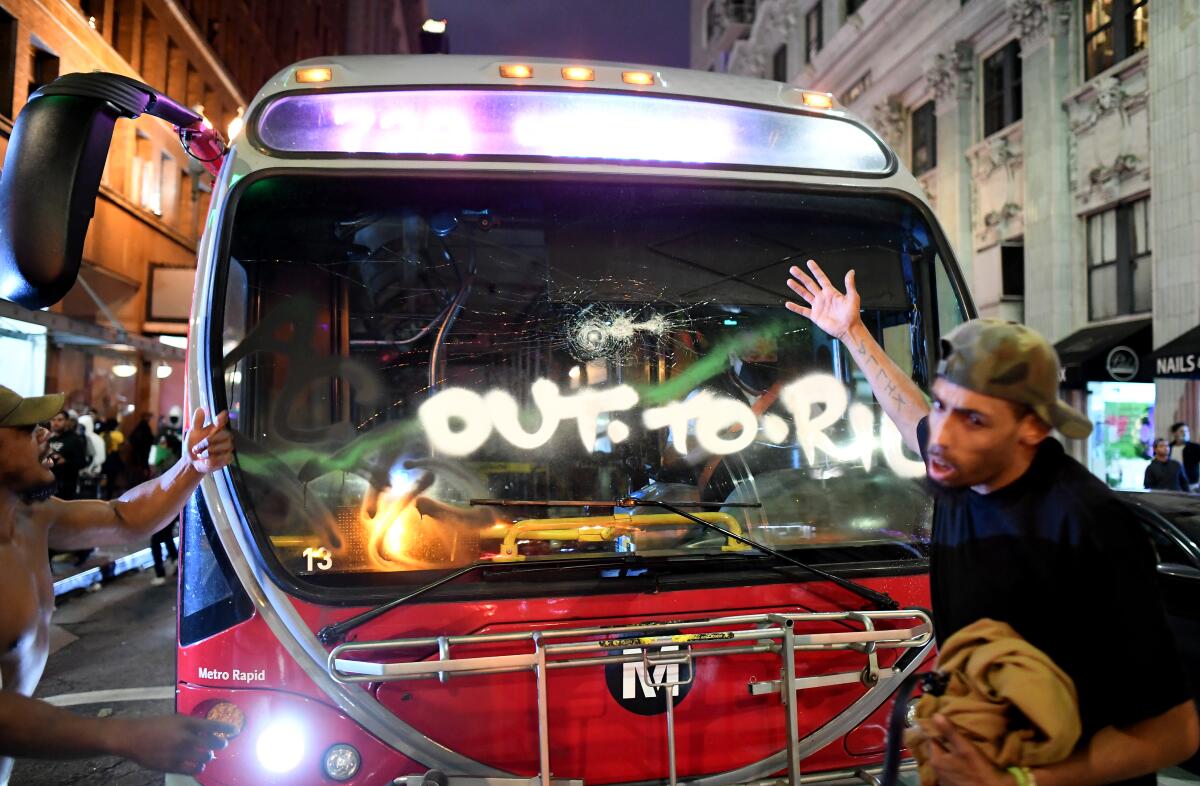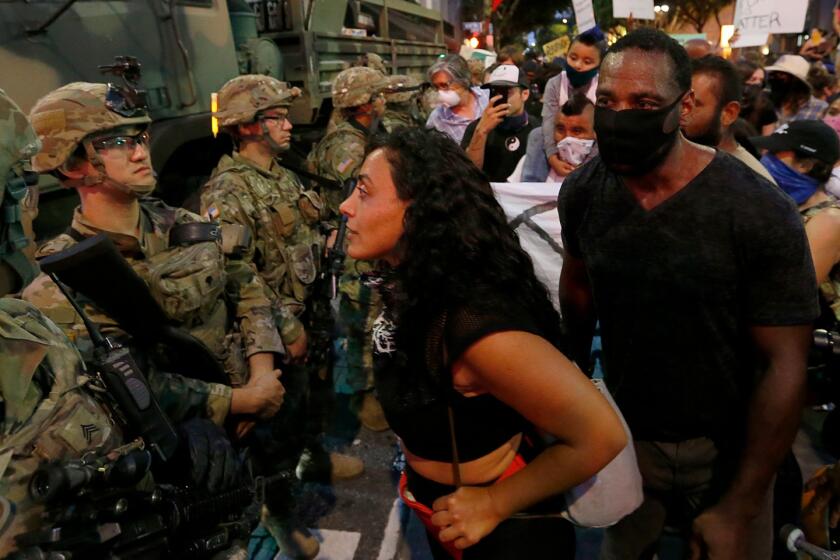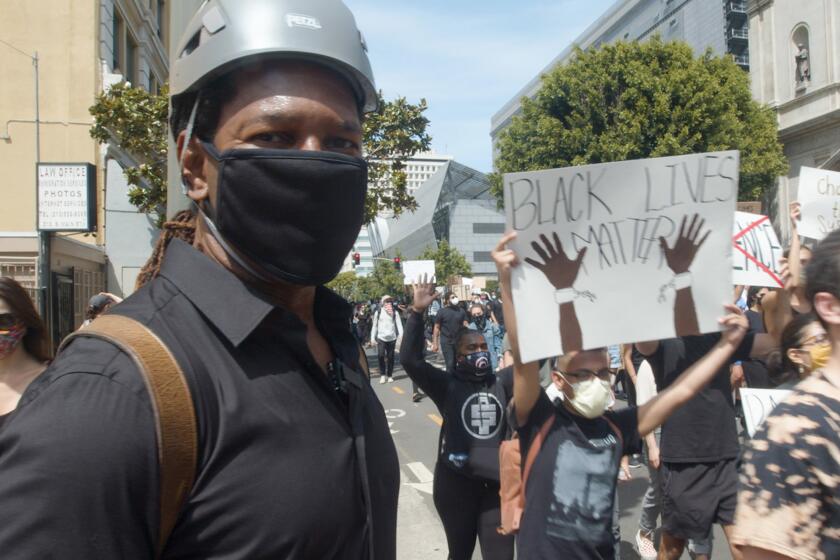‘Who approved this?’ Riders, officials criticize Metro’s systemwide shutdown

- Share via
As protests swept Los Angeles County on Saturday night, and officials in multiple cities imposed curfews, an unprecedented shutdown of the region’s bus and rail network left essential workers stranded on sidewalks and in bus shelters.
Hours later, the Los Angeles Police Department was seen ushering lines of protesters, their hands restrained with zip ties, onto orange Metro buses.
The juxtaposition enraged riders and advocates, who said it was inappropriate for a transit agency that primarily serves black and Latino riders to cooperate with law enforcement while thousands of people were marching to protest the death of George Floyd and police brutality against black people.
“You can’t tell me you’re cutting service to protect your drivers, and then turn around and put the drivers in the middle of all of it by transporting protesters,” said Brian Bowens, 47, a transit rider in Leimert Park and the chair of Metro’s citizen advisory council. “Where is the logic here? Who approved this?”
He continued: “This is going to have a lasting effect. Riders are going to remember.”
Get live updates from Los Angeles Times journalists as they report on protests across the U.S. after the death of George Floyd while in police custody.
Metro suspended service in downtown Los Angeles earlier on Saturday and had announced expected delays in protest areas. Shortly after the 8 p.m. curfew began in the city of Los Angeles, Metro expanded the shutdown to the whole system.
Chief Executive Phil Washington told KNX radio Saturday night that he had seen “a lot of damage,” and was concerned for the safety of Metro employees. Protesters in the Fairfax area surrounded a Metro bus on 3rd Street on Saturday afternoon, covered it in anti-police graffiti and clambered on top.
Concerns about safety were legitimate, but shutting down the entire system and stranding essential workers was “unconscionable,” said Los Angeles City Councilman Mike Bonin, a Metro director. He said he would question Metro’s senior leadership at the next board meeting in June.
“The whole reason people were in the street was because of injustice, and systemic problems,” Bonin said. “There’s a hell of a lot of overlap between the people who are getting screwed by violence and racism, and the people who use the transit system in Los Angeles. It’s not lost on me that a lot of the essential workers who got stranded were black and Latino.”
Washington said Saturday that Metro supervisors drove around the region on Saturday night to look for people at bus stops, then called nearby bus yards and asked them to dispatch vehicles to pick them up.
On Sunday morning, Metro apologized to riders who were stranded. Anyone who used Uber, Lyft or a taxi to get home after the shutdown can seek a refund by emailing [email protected] or calling (323) 466-3876, officials said.
Metro officials and Inglewood Mayor James Butts, who chairs the Metro board, did not respond to requests for comment.
During the 1992 riots, Metro’s predecessor agency suspended service in areas affected by looting and fires, but continued to run buses in some outlying areas.
Advocates questioned why the agency could not have taken a similar approach Saturday, to keep serving riders in the San Gabriel Valley, the South Bay, the north county and other regions where protests had not occurred.
“Better to be safe than sorry,” said county Supervisor and Metro director Mark Ridley-Thomas. If Metro had not shut down, and buses or trains had been “used as a vehicle through which more disruption took place,” he said, the agency would have been criticized for that, too.
“There was scathing criticism in 1992 that we delayed our response, and things got way out of control,” Ridley-Thomas said. “Loss of life and loss of property that could have been prevented had we had more support to manage the crisis.”
But, Ridley-Thomas said, he was not sure it was appropriate for Metro buses to carry protesters who had been arrested: “Law enforcement has vehicles to transport those who have been accused of violating the law.”
An official who was not authorized to speak publicly said each Metro bus carrying protesters had an escort from LAPD to reduce the risk of a conflict during the protest.
Carla, a 21-year-old student who works part-time as a security guard in a Century City office building, said she planned to take the bus home to Inglewood after her shift ended at 9 p.m. Saturday. After an hour of waiting, she checked Metro’s Twitter page and saw that service had been canceled.
She said she had expected some delays because of the protests, but not that Metro would cancel service entirely.
“I was mad and a little nervous,” said Carla, who declined to give her last name. “Being a young black woman, standing out on the street by yourself on a night like that — it’s not fun.”
At 2 a.m. Sunday, Todd Munson, 44 of Glassell Park, learned that a friend who had planned to take the bus back from Anaheim was stranded with no credit card. He was “really in the lurch,” Munson said.
The George Floyd killing has pushed black journalists to their emotional limits: ‘I walked six miles today trying to beat back the sorrow and depression.’
Munson began calling hotels in Anaheim but struggled to find one that was open during the pandemic and would accept payment by phone. Though he eventually secured one, he said, the whole situation was “really disheartening.”
As protests over the death of George Floyd rippled across the country, bus drivers in Minneapolis and New York City refused to drive buses filled with people arrested at protests.
John Costa, the president of a union that represents thousands of American bus drivers, said it was a “misuse of public transit” to transport people who have been arrested.
Bus drivers, Costa said, have a right to “refuse the dangerous duty” of transporting people who have been arrested, “away from these communities where many of these drivers live.”
Bus drivers in Los Angeles do not have such a clause in their contract. Officials from the union that represents Metro bus drivers did not return requests seeking comment.
More to Read
Sign up for Essential California
The most important California stories and recommendations in your inbox every morning.
You may occasionally receive promotional content from the Los Angeles Times.













